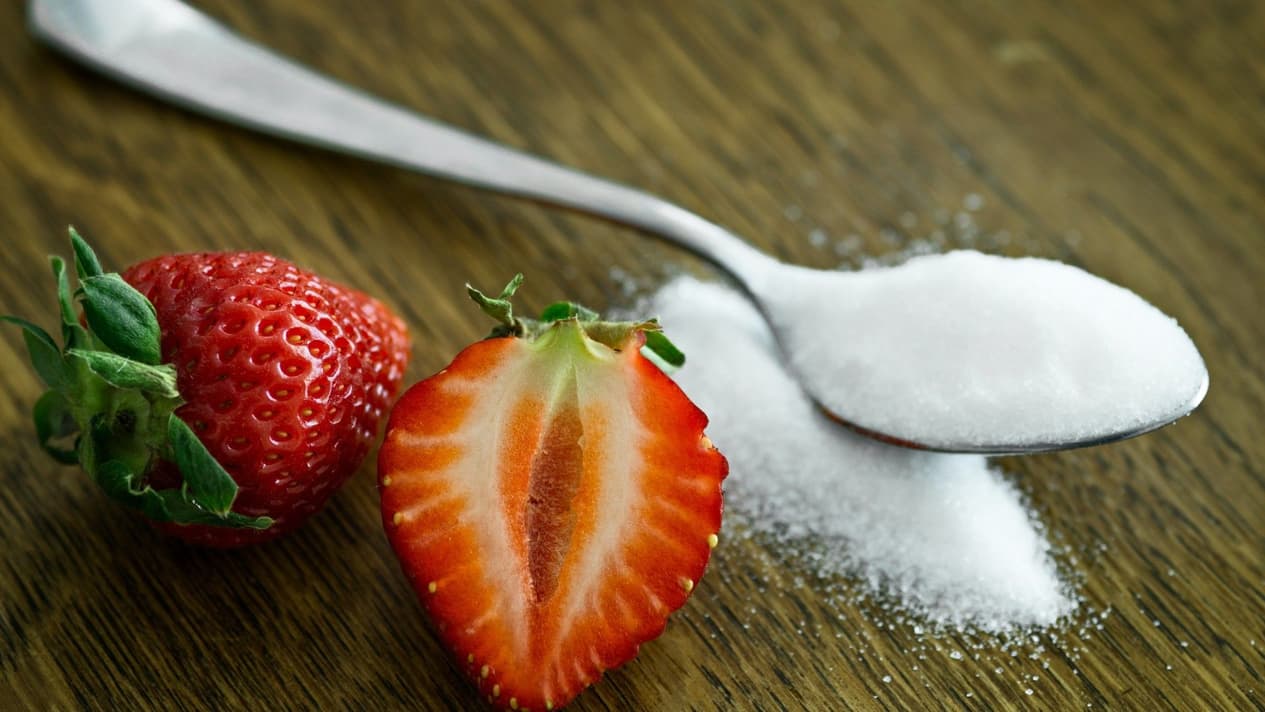If this morning you started off with an extra couple of teaspoons of sugar
into your morning cuppa or sneaked a fewOreocookies to your
morning protein shake... you are not alone!
However, while you may be in good company, this is not a habit you really want to get into. The not-so-sweet truth is that sugar consumption has increased dramatically in recent years, and our bodies are not designed to consume the levels which are now becoming normal. It's now suggested
that sugar is found in about 75% of the foods we eat with it amounting to
as much as 15% of UK adults' daily calorie intake (1). 200 years
ago, we were only consuming around 2 pounds of sugar in a year, but today
that figure has risen to an alarming 152 pounds a year- that’s 3 pounds per
week! This dramatic shift has reflected the addition of sugar into many
food products, but also the availability of sugar-filled products and
consumer choices.
What is sugar?
Sugar is a type of carbohydrate. There are two sub-types of sugar: monosaccharides, which are also known as "simple sugars" as they only have one molecule, and disaccharides which, as their name suggests, are made up of two molecules.
Monosaccharides include:
Disaccharides or polysaccharides are sugars with two or more molecules. Common disaccharides in food include:
What are the different types of sugar in our diet?
When you think of sugar, you probably think of the white stuff in the sugar bowl, but in fact there are many different types of sugar in our diet. Broadly speaking, we can divide dietary sugar into two groups:naturally occurring sugars andadded sugars.
Naturally occurring sugars are those which are found within foods such as fruit,
vegetables, honey, maple syrup, and milk. When we talk about added sugars, also known as 'free sugars', these include any sugars or sweeteners
that are added to food or beverages during the processing or preparation of
them, such as us adding them to our morning coffee or coffees. These added
sugars or sweeteners can include natural sugars such as white or brown
sugar, honey or caloric sweeteners such asSplenda.
Ultimately, your body processes all sugar in the same way. Natural sugars
and added sugars have the same chemical structures. The difference is that natural sugars occur in fruits and
vegetables that contain fibre and healthy nutrients, compared to processed sugary foods like cakes, biscuits, and sweets. There isn’t usually a
lot of natural sugar present in foods. Even a sweet fruit like an apple has
only around 15 grams of sugar. It also has 3 grams of fibre as well as vitamins
and antioxidant compounds that may help protect you from cancer and heart disease. Fruits are also full of different and delicious flavours, so ditch the muffins and have fun finding your favourite juicy, sweet fruits instead!
How much sugar should you have in a day?
To give our body the energy it needs, we should look to
vegetables, fats and proteins for our sugar intake. According to the NHS,
free sugars, or added sugars, should not make up more than 5% of the energy
(calories)you get from food and drink each day (2). The American Heart Association AHA recommends that the daily maximum
amount of added sugars you should eat in a day are 150 calories for men,
and 100 calories for women (3).
How does too much sugar affect you?
Escaping our exposure to sugar-laden products is not easy today. We are
surrounded by food, particularly in the west where sugary foods are cheap and readily available. We're also hard-wired to seek out sugar, and there is a connection between sugar and the brain. On an evolutionary basis, our primitive ancestors were hunters and
scavengers, and sugary foods were an excellent source of energy, so we have
evolved to find sugary food desirable and particularly pleasurable. So, we
have an innate brain system that makes us like sweet foods since they’re a
great sense of energy and fuel.
When we consume sugar, our brains are given a big rush of thefeel-goodchemical called dopamine, which helps explain why we are
more likely to crave chocolate or ice cream after a bad day at work or a
night out than, a piece of broccoli or a carrot stick! (4)
Getting a dopamine hit means we’re more inclined to turn to
sugary foods again, as we want to experience that hit again. Thisfeel-goodresponse that comes from quick sugar
fixes is a hard response to turn away from - it’s one of the reasons that
turning to high sugar food sources can become addictive and a hard habit to
break. It's believed that sugar can be more addictive than opioid drugs! Definitely 'food for thought'...
If you are a regular high sugar user, and then stop, you might start to
feel anxious or jittery- this is known as a ‘sugar crash’. A study
undertaken in the United States using brain scanning technology showed that
sugar caused changes to occur in peoples’ brains, similar to those who were
addicted to drugs such as cocaine and alcohol (5).
Most people think that eating carbs for energy will fix a sugar crash, but
it will only temporarily boost energy. The underlying problem is protein
malnutrition, and during a sugar crash, the body is looking for protein
sources to balance out blood glucose levels. So make sure to eat some
protein otherwise the sugar crashes will continue (6).
When you eat foods containing lots of added refined sugar, especially when they are low in proteinand complex carbohydrates, they are metabolised very quickly and enter the bloodstream. This can give us that well-known 'sugar rush' and a burst of energy. Too much sugar can make us feel too 'wired', however, and we may experience other unpleasant symptoms, such as thirst, dry mouth, increased urination and blurred vision. High blood sugar triggers the release of insulin, which then lowers blood sugar leading to tiredness, dizziness, and often an intense hunger for more sugary foods as the body tries to stabilise its blood sugar levels. This can create a vicious cycle and a sugar dependency. Long-term blood sugar dysregulation has been associated with insulin. Choosing low-sugar options, and making sure that all meals and snacks contain protein, complex carbohydrates,and healthy fats can help to stabilise blood sugar levels, as these other nutrients help to stop sugars in food from being metabolised so quickly and spiking blood sugar.
In addition to the short term effects of sugar over-consumption, more serious, long term health issues have been identified.
Sugar and oral health
The impact of high amounts of sugar on our teeth can be dramatic. Sugar
consumption is directly connected to tooth decay.
Studies show that a select group of harmful bacteria produce acid in your
mouth whenever they encounter and digest sugar. These acids remove minerals
from the tooth enamel (the shiny, protective, outer layer of your tooth).
This process is called demineralization (7).
Saliva helps to constantly reverse this damage in a natural process called
remineralization. The minerals in your saliva in addition to fluoride from
toothpaste and water, help the enamel repair itself by replacing minerals
lost during an “acid attack” which helps strengthen your teeth.
However, the repeated cycle of acid attacks causes mineral loss in the
enamel. Over time, this weakens and destroys the enamel, forming a cavity.
The cavity is a hole in the tooth caused by tooth decay and it is the
result of harmful bacteria digesting the sugar in foods and producing
acids.
Sugar and inflammation
If you are prone to painful joints, especially if you suffer from
conditions such as arthritis, eating large amounts of sugar has been shown
to make joint pain worse. Sugar consumption has been shown to worsen inflammation and inflammatory conditions, due to the pro-inflammatory response it causes in the body. Chronic inflammation has been associated with the development of a variety of health conditions including cardiovascular disorders, psoriasis, diabetes, and autoimmune conditions. For example, a research study looking at regular drinkers of sugar-sweetened
soda found its consumption increased their risk of developing rheumatoid
arthritis (8).
Sugar and obesity
By consuming large amounts of added sugar over time, our natural balance of
hormones can be impacted. When these are impacted, the critical functions
they assist in the body can be impaired, and also lead to weight gain. When
we eat sugar our glucose levels within our bloodstream increase, which
triggers the pancreas to release insulin. Having higher levels of insulin
causes the body to store more food calories as fat, and impacts a hormone
known as leptin. Leptin acts as a natural appetite suppressant in the body.
It gives out a command to our brains to tell it that we are full and the
time to stop eating is now! By having an imbalanced insulin level and
consuming large amounts of sugars, we can put ourselves at risk for a
condition known as leptin resistance, where the ‘stop eating!’message is no longer heard which can result in weight gain, overeating and
potential obesity (9).
Sugar and high blood pressure
High salt intake is associated with high blood pressure, also known as hypertension; however, it may surprise you to learn that hypertension has also been shown to be associated with a high-sugar diet. This is thought to be due to the fact that high
levels of glucose can cause damage to the delicate lining of our blood
vessels, making it easier for cholesterol to stick to the walls of the
blood vessels. This results in hardening of the blood vessels and an
increase in blood pressure as a result (10).
Sugar and skin health
Before we set out to blame the years catching up on us, or an allergy to
new makeup, sugar may be to blame for our skin looking less than happy.
Research from the American Academy of Dermatology suggests glycemic
control, or the controlling of our glucose levels, plays an important role
in our skin health and acne, and insulin resistance can influence the
development of acne. The findings showed that those who switched to a
low-glycemic diet showed significantly less acne over a period of time (4).
Sugar and sleep
Consuming excessive amounts of added sugar can mess up our sleep patterns.
If you are struggling to fall asleep and remain asleep, then sugar might be
the culprit! Oursleep cyclesare regulated not only by factors such as light and temperature but also by
our glycemic control. If you are regularly consuming large amounts of added
sugar and struggling to have good quality sleep, sugar may be a factor.
Sugar and gut health
We shouldn’t be too quick to blame the spice in the curry we had last night
for our digestive issues such as cramping and diarrhoea - too much sugar is also known to irritate the gut. Diets high in sugar can increase the
inflammation in our guts and impact the gut bacteria levels. Those who
suffer from gut conditions such as Crohn’s disease or Irritable Bowel
Syndrome can find that a diet high in sugar can aggravate their conditions
due to the high sugar diet leading to more inflammation. If a diet is
consistently high in added sugars instead of one which includes fruits,
vegetables and whole grains, then constipation can become a problem.
Additionally, high sugar consumption can encourage the growth of pathogenic (bad) bacteria and yeasts in the gut, which can affect the health of the gut microbiome. An overgrowth of pathogens in the gut - known as dysbiosis - has been associated with the development of various digestive, immune-mediated, metabolic, and neurological diseases, and can have a negative effect on our overall health and wellbeing (12).
Sugar and mental health
Sweet foods are often considered to be treats and comfort foods which make us feel good, but the reverse could actually be true. As well as our physical health, high sugar consumption may even affect our mental wellbeing.
Regular high sugar intake has been shown to be linked to mood disorders (13), and a higher incidence of anxiety (14). As previously mentioned, this could be partly to do with the effect of blood sugar peaks and trough, which can affect our mood, make us feel tired, jittery or anxious.
Eating a very sugar-heavy diet has also been associated with an increased risk of depression (15). It may also give you a foggy brain and impair cognitive function (16).
The odd sweet 'treat' or pudding is fine, but if you're looking to improve your diet with a view to supporting your mental health, then monitoring your sugar intake could be a good place to start.
Top tips to reduce sugar intake
Sugar consumption - key takeaways:
If you enjoyed this article, read these other related articles on our blog:




